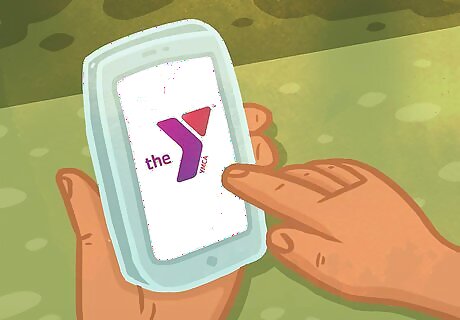
views
Finding Ways to Meet People

Look for friends in your neighborhood. Sometimes new friends are just around the corner, so you can start by making friends from your neighborhood. If there are any people in your neighborhood that are around your age, introduce yourself to them. Invite them to play a game, hang out, etc. You can even help set up a community group in your neighborhood. Parents and adults can help out, too. The neighborhood group can host block parties, start a community garden, volunteer for good causes, etc. It’s a great way to make new friends! A smile can go a long way when you're trying to meet people in your neighborhood!

Sign-up for an after school activity or community service. If you are looking for friends outside of school, then make good use of your afternoon and weekend time by picking up a new community activity, or volunteer for service. This is a way to meet people from outside of your school, who could become your friends. Examples of activities include: Sports (not based at school—try a local recreation center or YMCA) Religious groups Community organizations (animal shelters, community gardens, neighborhood watch, etc.)

Sign up for a club. Many cities have clubs and interest groups that aren’t based in schools. Since these bring diverse people together, they can be great opportunities to make non-school friends. For example, you might be able to join: 4-H Scouts A club based on a hobby (gardening, knitting, chess, programming, etc.) Music A music group (a community orchestra, choral group, choir, or band) An art club A book club

Sign up for camp. Summers between school years can be a little isolating if you don’t have a lot of friends outside of school. By taking part in a summer camp, however, you’ll have the opportunity to meet lots of new people, and make new friends. There are lots of different kinds of camps, ranging from ones that feature on outdoor activities, to ones focused on religious groups, to ones that foster academic enrichment. If you’re interested in signing up for a camp, ask your parents for permission and help.

Work part-time. Getting a job is not just for making money—it’s also potentially a way to make friends. If you’re in school, you might not be able to get any job, and you will have to work part-time, but getting a job can still be an opportunity. Once you find one, connect with any coworkers of your age or that share your interests, and start forming friendships.

Try the internet. There are lots of ways to meet new friends online, including forums, interactive games, social media, etc. However, it is important to find a balance between your online and offline time and friends. You should also be safe online. For instance: Never give out personal information to someone you just met online. Report any suspicious activity to your parents or a trusted adult. If you feel uncomfortable, harassed, bullied, or endangered by what anyone says or does to you online, let your parents or a trusted adult know about it.
Building Friendships

Introduce yourself. When you meet someone new, it’s important to start with a good introduction. Say “hello,” give your name, and ask the other person’s. If you repeat the person’s name when he or she tells you, you’ll be more likely to remember it.

Start a conversation with someone. Talking with people is the next step to forming friendships. There are lots of ways to start conversations and small talk with other people, even if you don’t know of anything specific to talk about at first. Once things get started, just try to keep the conversation going naturally. Offer a compliment, like “Hey, I really like that shirt!” Ask lots of questions. This gives you and the other person something to say, and keeps the conversation moving. For instance, if you like a person’s shirt, you could follow up by asking “Where’d you get it?” Listen carefully and respond to what the person says, so that you form connections. For instance, if someone tells you “I got this shirt at the mall—I shop there all the time” you could respond with something like “Me too! What are your favorite stores?” It’s ok to keep initial conversations short so you don’t ramble, but if you seem to be hitting it off with a new person, let things flow.

Keep in touch. When a conversation with a person you just met is ending, and you’d like be friends, make sure to exchange some form of contact information. At that point, or later on, the two of you can suggest another time to meet up, hang out, talk, etc. Regular, scheduled contact is the best way to form and maintain friendships. If you’re making friends with someone outside of school, make sure the two of you can spend some time together in the afternoons, evenings, or weekends.

Be a good listener. A friendship is a two-way street. While you might be looking to meet new people, once you make a friend, remember that you have a relationship. Your friend relies on you, too. Make sure to listen and respond to your friend, to show that you’re caring and supportive. Provide a safe space for your friends to come and seek advice. Their problems might be different from your own, but learning from other people is part of building friendships! If a friend wants to or needs to talk and you can’t, say that you will get in touch later—and follow up. If you ever have to bail on a friend, apologize sincerely and take the initiative to set something else up.

Plan some pressure-free ways of hanging out. If you’re shy or have trouble forming friendships, plan activities that take up time without putting too much pressure on you to talk constantly. Anything that provides a topic or focused activity will give you and your friend something to talk about without causing pressure. Good options include: Going to the movies Watching a sporting event Visiting the zoo, a museum, etc. Playing a game

Get help if you need it. If you’re having real trouble figuring out how to make new friends or talk to people, don’t be afraid to ask your parents, current friends, or other trusted people for help. You can even practice conversations with them until you feel more comfortable about making new friends. Parents shouldn’t be in charge of your friendships, but they can help by connecting you to children of their friends.




















Comments
0 comment